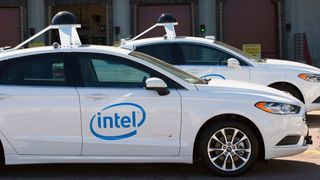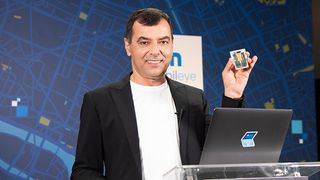
Mobileye – the self-driving car company acquired by Intel for $15 billion in 2017 – has outlined its plans to bring autonomous vehicles (AVs) to the masses through new laser sensor technology intended to lower the cost of producing self-driving vehicles.
Speaking at CES 2021, the company announced it has integrated LiDAR technology – that's lasers that measure depth and distance – into an Intel silicon chip, meaning its ambitious plans to bring cheap, self-driving cars to retail buyers by 2025 could become a reality.
Mobileye president and CEO Amnon Shashua detailed why the Intel subsidiary is so confident of achieving its lofty targets: "The backing of Intel and the trinity of our approach means that Mobileye can scale at an unprecedented manner," Shashua said.
"From the beginning, every part of our plan aims for rapid geographic and economic scalability – and today's news shows how our innovations are enabling us to execute on that strategy."
- Could Intel regain dominance in 2021?
- Tesla will make its fully autonomous mode accessible to more drivers
- Hyundai is in early talks to help make Apple's self-driving car
The Israeli company has about 80% of the global market for advanced driver-assistance vision systems, and currently focuses its efforts on car features that help drivers overcome blindspots or stay in their lanes.
Its partnership with Intel – and the recent LiDAR-on-a-chip breakthrough – means Mobileye can pivot development away from camera-based car technology and towards a full self-driving sensor suite to be built in-house, keeping production costs down and making autonomous vehicles as accessible as possible to the mass-market.
"The ultimate holy grail is that everyone can go and purchase a car and have that car be autonomy enabled," Shashua said in an interview with Bloomberg.
Get daily insight, inspiration and deals in your inbox
Get the hottest deals available in your inbox plus news, reviews, opinion, analysis and more from the TechRadar team.
"That's a dream that can come true in the 2025 time frame. We are in serious discussions with several car manufacturers to start taking this kind of technology."

Intel has had a rough time of it recently. The chip giant has been accused of lagging behind rivals like AMD and Apple when it comes to processor innovation, and has been set back by numerous manufacturing delays even before the outbreak of the Covid-19 pandemic.
But the announcement that its subsidiary, Mobileye, has made such a breakthrough in AV development will appease those excited by the company's important part to play in the future of self-driving vehicles.
LiDAR love
The challenge of shrinking down LiDAR technology in both size and cost is one familiar to the major players in the AV industry.
Companies like Aeva and Voyant Photonics, for example – the former develops assistive technology for Porsche – are working on their own methods of condensing LiDAR to its smallest possible size to fit multiple sensors into a single car (currently, most LiDAR sensors are roughly the size of hand).
But Mobileye's partnership with Intel means the company has access to large-scale manufacturing resources that other developers don't, meaning it'll be able to produce its new LiDAR chips – which will allow cars to spot hazards on the road from 200 meters away, according to Shashua – en masse and (hopefully) on time.
The news comes amid a period of rapid development for the AV industry. Foxconn, the major manufacturing supplier to Apple and Tesla, has partnered with Chinese startup Byton to help produce the company's first electric vehicle, the M-Byte, which looks set to integrate autonomous technology in an affordable package.
Tesla, too, recently hinted at plans to offer its Full Self-Driving (FSD) mode to customers through a monthly subscription in 2021, meaning drivers won't have to fork out large lump sums to gain access to the innovative technology.
Mobileye's breakthrough means Intel has gained a foothold in the automotive market, but more importantly marks an exciting development for drivers hoping to benefit from a technology that has long been trapped in the domain of science fiction and, more recently, the rich.
By 2025, autonomous wheels may no longer be the subject of wishful thinking.
- Check out all of TechRadar's CES 2021 coverage. We're remotely covering the online-only show to bring you all the breaking tech news and launches, plus a smattering of hands-on reviews.

Axel is a London-based Senior Staff Writer at TechRadar, reporting on everything from the latest Apple developments to newest movies as part of the site's daily news output. Having previously written for publications including Esquire and FourFourTwo, Axel is well-versed in the applications of technology beyond the desktop, and his coverage extends from general reporting and analysis to in-depth interviews and opinion.
Axel studied for a degree in English Literature at the University of Warwick before joining TechRadar in 2020, where he then earned an NCTJ qualification as part of the company’s inaugural digital training scheme.

Wear OS 5: what we want to see, and all the leaks so far

The obscure little PC that wanted to be a big NAS — super compact Maiyunda M1 doesn't cost that much, offers up to 40TB SSD storage, runs Windows and has 4 Gigabit Ethernet ports

Image site Abload going offline reminds me of how much online content we've permanently lost
Most Popular

